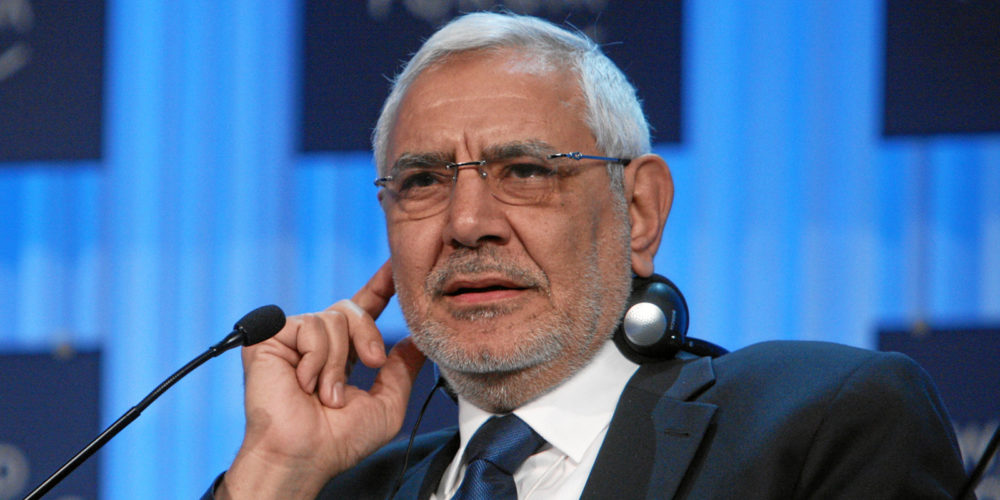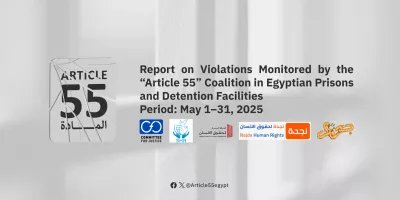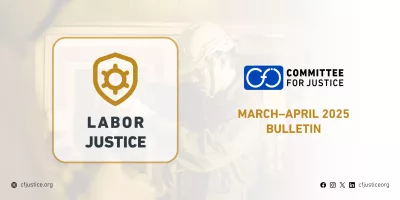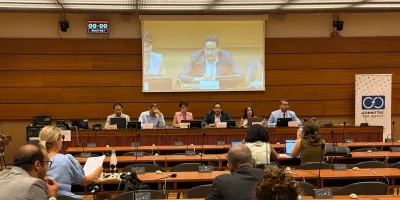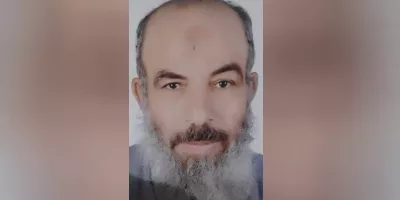Press Release
Translated and edited by: CFJ
Geneva: September 3rd, 2023
The Egyptian authorities responded to the United Nations memorandum regarding the arrest and detention conditions of the former presidential candidate and politician, Dr. Abdel Moneim Aboul Fotouh. The memorandum was sent by UN experts in May 2023, and was based on a complaint previously filed by CFJ to the UN experts. The Egyptian authorities linked his case to an alleged plan by the Muslim Brotherhood to spread chaos in the country following the military coup against the former Egyptian president, Mohamed Morsi, according to their claims.
Egyptian Authorities’ Allegations:
In their response sent in August 2023, the Egyptian authorities claimed that leaders of the Muslim Brotherhood attributed responsibility to Aboul Fotouh for executing the plan and working to escalate hostile actions against the state and its institutions. They alleged that he arranged to infiltrate and occupy vital public institutions and security establishments, including AlIttihadiya Presidential Palace, Cairo Airport and Burj al-Arab port, the seizure and destruction of weapons in security facilities, the assassination of some public figures and a number of ministerial employees, and setting fire to the Office of the Prosecutor General, the Supreme State Security Prosecutor’s Office and some of the main court buildings, without providing any evidence to support these claims.
The Egyptian authorities also used interviews conducted by Aboul Fotouh with Arab satellite channels as evidence for accusations such as spreading false news and rumors about the internal
situation in the country. Additionally, they claimed in their response that the prosecution had proven his involvement in the alleged plan to destabilize the country.
The Egyptian authorities stated that the assertion that Aboul Fotouh was denied a fair trial before the State Security Emergency Court is untrue. They explained that the law allows for the establishment of specialized courts to handle terrorism-related cases referred to them by the criminal courts of the Cairo Court of Appeals. These specialized courts are composed of regular judges and operate according to the procedures outlined in the Egyptian Criminal Procedure Law without exception.
They further emphasized that the State Security Emergency Court is a regular body with defined composition, guarantees, rules, and regulations. The Emergency Law No. 162 of 1958 does not specify special procedures during sessions of the State Security Emergency Court, and the provisions of the Egyptian Criminal Procedure Law apply to all procedures.
The Egyptian authorities have confirmed in their response that the Public Prosecution has initiated investigations into the deprivation of healthcare for Aboul Fotouh. This includes medical examinations to ensure that his body shows no signs of injury. The authorities have also followed up on his health condition and made sure that he “receives the necessary medical care.” The authorities also stressed that he receives all kinds of medical care from the prison hospital doctors and specialized consultants contracted with them. He is also provided with the necessary medication for his condition, just like other prisoners, according to their statement.
The Egyptian authorities also claimed that Aboul Fotouh has not been subjected to solitary confinement, and that he has not received any disciplinary penalties. Furthermore, he receives regular visits from his family, in accordance with prison regulations.
Suppression of Freedom of Expression:
On the other hand, CFJ rejects the claims made by the Egyptian authorities in their response to the UN memorandum, demands the immediate release of Aboul Fotouh due to the severe deterioration of his health condition.
CFJ pointed out that Aboul Fotouh’s health condition is deteriorating, as he suffers from repeated episodes of ischemic heart disease (angina attacks). With worsening detention conditions and limited supply of nitrate tablets,he is currently experiencing angina attacks every ten days on average. This requires urgent cardiac examination and precise monitoring in a suitable medical environment, which cannot be provided in his current detention place.
CFJ also noted that Aboul Fotouh is suffering from an advanced prostate disease that requires urgent surgery, along with various complications such as urinary tract infections, extremely painful urinary spasms, loss of bladder control, as well as kidney and bladder stones.
Unfair State Security Courts:
Regarding the claim by the Egyptian authorities that Aboul Fotouh was not denied a fair trial, CFJ stresses that the State Security Emergency Court is an exceptional court, where its judges are appointed and selected by the Ministry of Justice. Its verdicts cannot be appealed, thus limiting the defendants’ right to proper litigation, making it a trial that does not adhere to international and UN-recognized fair trial standards.
The Egyptian authorities also claimed that the prosecution had proven Aboul Fotouh’s involvement in the alleged plan to destabilize the country but did not mention that these investigations relied on reports provided by the National Security Agency, which are often influenced by the agency’s biases and not necessarily based on factual evidence.
Harsh Detention Conditions:
CFJ highlighted that Aboul Fotouh is subjected to harsh detention conditions, contrary to the narrative presented by the Egyptian response. He has been in isolation since his arrest, confined to a separate cell from other inmates in 3×2 m cell. He is allowed only 90 minutes of fresh air daily, and his movement is severely restricted within the same wing where access to sunlight and fresh air is limited. He cannot access the prison library, mosque, or any outdoor space, and his communication is limited to guards only. He has been deprived of books, newspapers, magazines, television, and radio.
Regarding visits, CFJ stated that he is allowed only one visit of 20 minutes per month behind a glass barrier with direct family members (since the beginning of 2020, only one immediate family member is allowed per visit). Written communication with family is allowed once a week, and each letter must be approved by prison authorities before delivery. His communications with his lawyer are heavily restricted and continuously monitored, with no possibility of private meetings, including during renewal of custody sessions.

